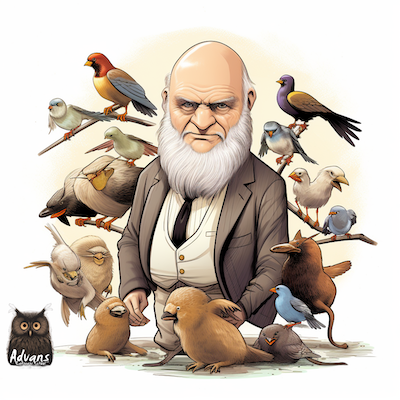In the annals of scientific history, few names loom as large as that of Charles Darwin. A man of paradoxes, Darwin was both an accidental revolutionary and an intentional iconoclast. His journey from uncertain youth to the forefront of evolutionary theory is as fascinating as the Galapagos Islands he famously explored.
Darwin’s early life reads like a series of misadventures in career indecision. Like a butterfly unsure of which flower to alight upon, he fluttered between paths, trying his hand at medicine and briefly entertaining thoughts of clerical life. Little did he know that his destiny lay not in the pulpit or the operating theatre but in the uncharted territories of scientific inquiry.
Embarking on the HMS Beagle in 1831, Darwin found himself in a role that suited him like a well-tailored coat: that of the ship’s resident naturalist. His five-year voyage around the globe was akin to a grand scientific safari, with Darwin as the intrepid explorer armed not with a rifle but with a keen eye for observation and an insatiable curiosity.
Darwin’s musings on the diversity of life took root during this odyssey. They sprouted into the towering tree of his theory of evolution. From the pampas of South America to the volcanic archipelago of the Galapagos, he gathered the seeds of his groundbreaking ideas, carefully cultivating them into the fertile soil of his intellect.
The fruit of Darwin’s labour, “On the Origin of Species,” unleashed a storm upon the scientific and religious communities. Like a thunderclap in a tranquil garden, his theory of natural selection shattered long-held beliefs about the divine order of creation. Yet, amidst the controversy, Darwin remained steadfast, refusing to be drawn into theological debates like a wise tortoise withdrawing into its shell.
Despite his detractors, Darwin’s legacy is a beacon of enlightenment in the murky waters of ignorance. His theory, once viewed with scepticism, now stands as a cornerstone of modern biology, a testament to the power of observation, experimentation, and intellectual courage.
As we reflect on the life and work of Charles Darwin, we are reminded that even the most unlikely of caterpillars can metamorphose into intellectual butterflies, soaring to heights undreamed of. So let us raise our glasses to the man who dared to challenge the status quo, who dared to ask “Why?” when others remained silent. In the man’s words, “It is not the strongest of the species that survives, nor the most intelligent that survives. It is the one that is most adaptable to change.” Cheers to you, Mr Darwin, for showing us the way forward.
5 lutego, 2024

